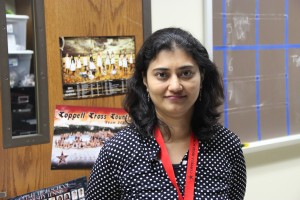Shruthika Pochampally
staff writer
@shruthreddy
In addition to new administration staff, many new teachers have joined Coppell High School for the 2014-2015 school year. Richa Bhatt, a Pre-AP Biology and IB Biology teacher, has begun her journey as an IB teacher for the first time (International Baccalaureate is an educational program that prepares students for international experiences through rigorous courses and extensive student and research led assignments).

This is Bhatt’s second year as a high school teacher. The Sidekick’s Shruthika Pochampally met with Bhatt to talk about her background as well as her thoughts and goals for the upcoming year.
Q: What is your educational background and previous teaching experience?
A: I did my BS (Bachelor of Science) in Life Sciences and I got my Master’s in Science Education from UTD (University of Texas at Dallas). I am originally from India but I moved to the [United States] in 2000. Though this is my second year in public education, I have been teaching introductory biology at a community college for about 10 years, so that is why I feel comfortable teaching IB biology. Before this, I was teaching at North Garland High School.
Q: What are you most excited for as a Pre-AP Biology / IB Biology teacher at Coppell High School?
A: What I like about the [Coppell ISD] is the use of technology. Every student has an iPad and that’s really good because now we are using Google Docs and it really helps for collaborating in projects, and it becomes very easy for me to grade too. Since on Google Docs they can all work together, I can see how much each student contributed. Technology integration is very nice and it’s on a really big scale over here. Everybody can just upload documents onto Google Drive or Google Docs and they can edit it and submit it, so that makes it very easy.
I’m going to be using the technology a lot. I’m using Google Docs so students can write on the document. I also like the Discovery Education site. We have got some good resources where I can tell students to read a specific section and then I can monitor them. Sometimes some concepts I explain through presentation, students do not get it. Now I can make use of those animated simulations.
I like the flexibility [CHS] has given you everything and you do have some guidelines, but you can decide what you want to do and when you want to do it.
Q: What is something about teaching IB that is different to what you have been used to teaching with for the past few years?
A: It is my first year teaching IB. I found out one thing about the IB students enrolled which is that they are dedicated to the subject and content. I’m doing both IB I and IB II, and for both, I found the same thing. Even the juniors are very serious about what they are doing. We did one lab with weights to see the effects of different factors on transpiration, where they had to set up a potometer and investigate factors that affect transpiration. They’ve done the lab and now they have to write an investigative report on that. I have seen the involvement of the students. They are very serious about their education.
Q: In comparison to the previous school you taught at, what is different about CHS?
A: This school is much bigger in size. My previous school had about 2,000 students and over here you have over 3,000. At the beginning I was scared when I looked at [the] hallways; it was like a sea of students moving. But the opportunities for the students here are really good if they take advantage of it. One is, my previous school did not offer IB, and you also have Dual Credit here. I’ve [also] noticed you have a lot of clubs. I don’t even know what they all are; it’ll take me some time to get familiar with all of the clubs.
Q: What would you say your teaching style is like?
A: I don’t want to do too much lecturing because when we just lecture, it does not get across to the students. I would prefer more of a hands-on approach. Today we did the water strider lab. We are starting a new unit soon on biomolecules and the properties of water. But without even giving them any intro on it I just gave them a lab handout and [asked them to] work on the lab, collect the data, and practice the scientific process.
It really helps the students in research when you have small PBL (project-based learning) projects. Projects and all these inquiry-based labs help students rather than just lecturing because if you keep lecturing they mostly just fall asleep. Sometimes I also tell them to present them after they are done.
Q: Do you have any concerns or worries towards the upcoming year?
A: It’s the third week, and what I have noticed while teaching freshmen is that the most important thing is to get the class rules across. I’m taking the time every day the first two weeks just making sure they understand and going through them repeatedly with them. I think the biggest thing is to enforce the rules, especially technology discipline policy rules. Otherwise they are very good students and when it comes to working they do a fantastic job.








